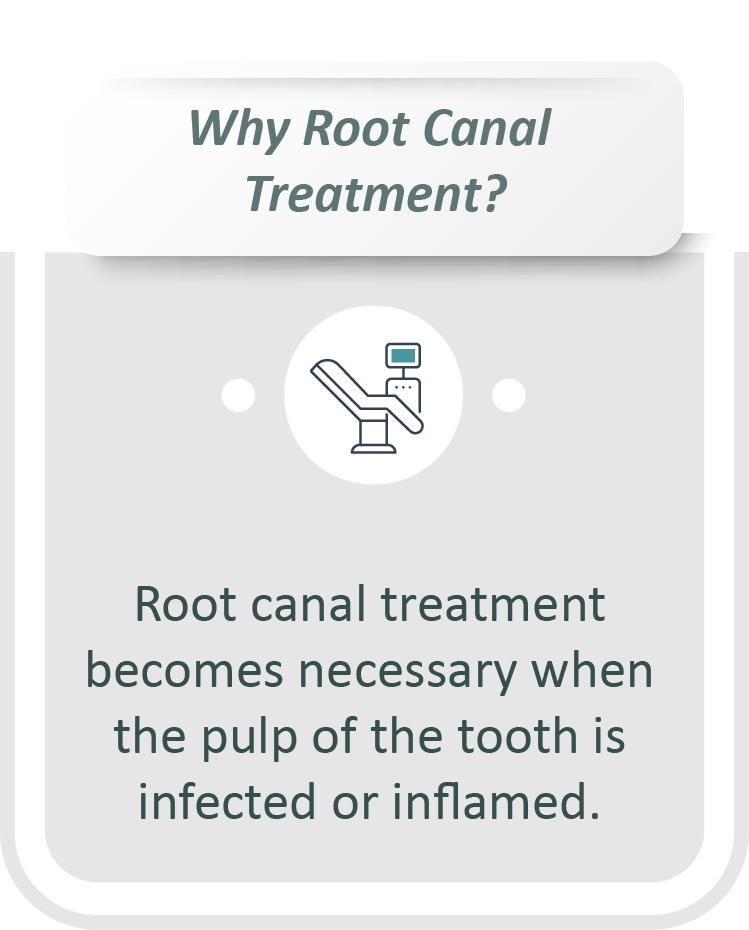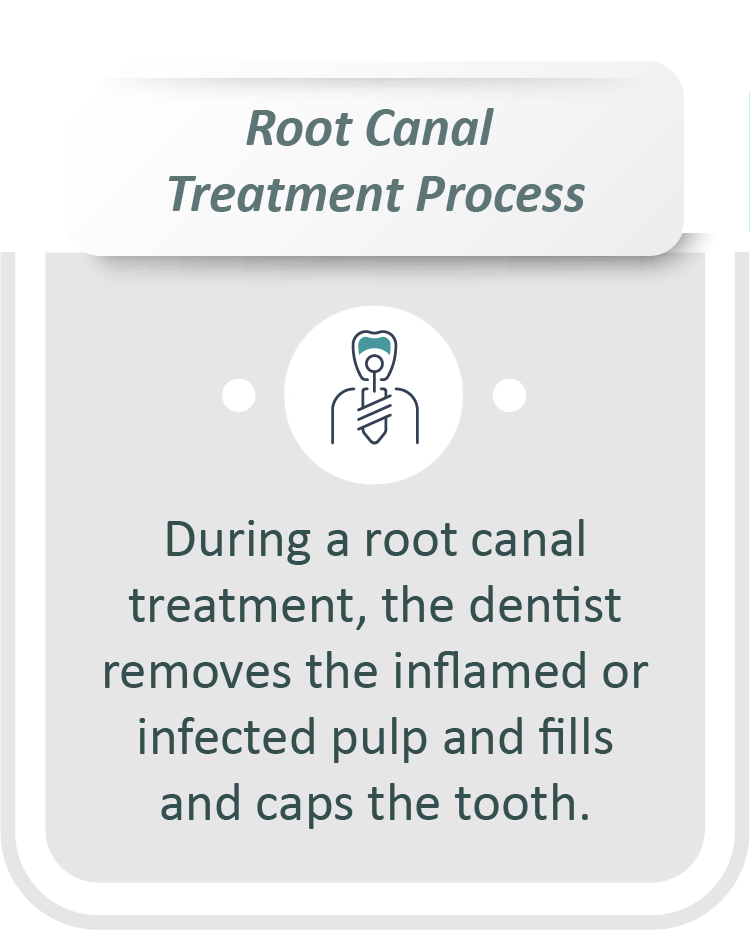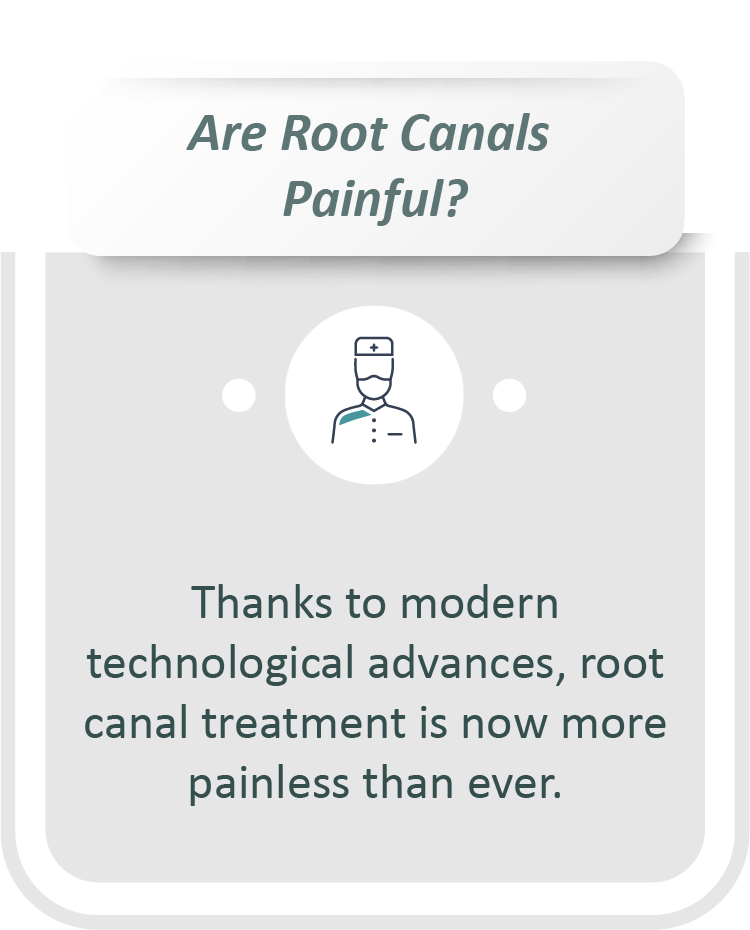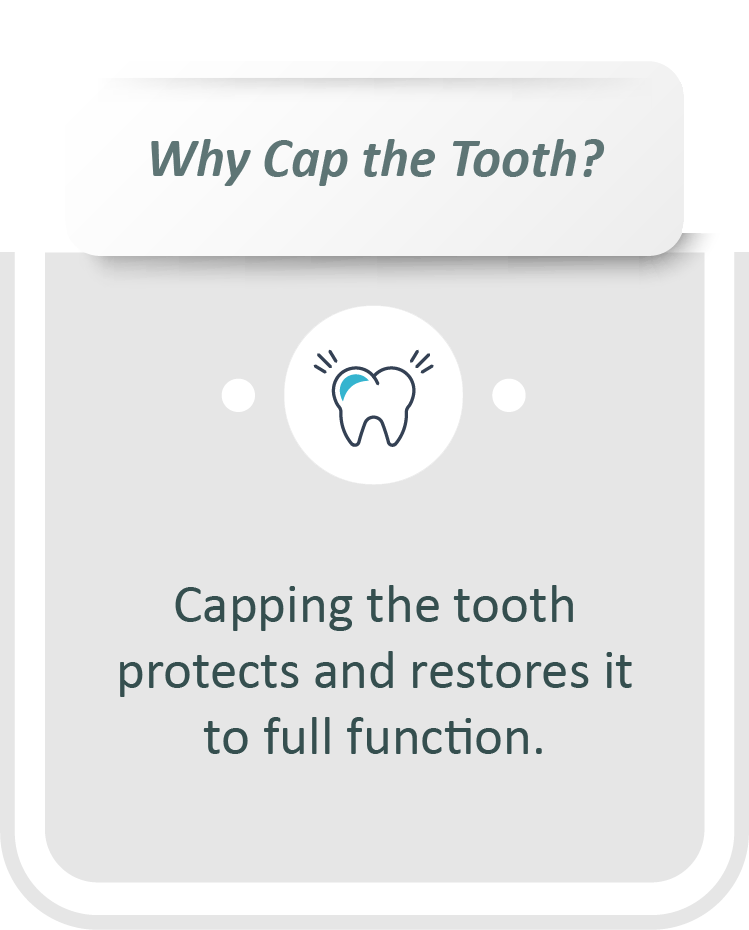Root Canal Treatment Cedar Park, TX
A root canal is a restorative dental procedure that saves millions of teeth from inflammation and infection each year. Root canal treatment involves removing the damaged pulp and nerves from inside the tooth to eliminate bacteria and prevent the infection from spreading. If you have an infected tooth, root canal treatment may be able to save it.
Root canal treatment is available at Parmer Oaks Dental Care in Cedar Park and the surrounding area. This procedure can relieve dental pain and save your tooth. Call us at (512) 354-4450 to learn more about our services or schedule an appointment today.
Understanding Root Canals
Below the enamel and dentin, there is pulp at the center of a tooth. The pulp contains blood vessels, nerves, and connective tissue. When the pulp becomes injured or infected, the patient may experience swelling, infection, and pain. Even when outwardly apparent symptoms are not present, bacteria within the root canal may cause decay and damage to the jawbone. In many cases, a root canal may be necessary to save the tooth.
A root canal can remove the infected or inflamed pulp to prevent further issues. Various situations can call for a root canal, such as repeat dental work on the same tooth, cracks or chips, deep cavities, or a tooth injury. Signs that a patient may need root canal treatment include bumps along the gums, darkening gums, severe pain or sensitivity while biting or chewing, and swollen or tender gums. People should be aware that the signs of root canal infection or injury are not always obvious and that a thorough examination may be necessary for diagnosis.
“A root canal can remove the infected or inflamed pulp to prevent further issues.”
Root Canal Treatment Benefits
The goal of root canal treatment is to save and preserve the natural tooth. One of the biggest benefits of root canals is getting rid of pain and infection in the mouth. Additional benefits include:
- Improved appearance: After root canal treatment, the patient will receive a crown or filling that restores their tooth's aesthetic appearance.
- Reduced risk for further decay: Removal of the infected dental pulp prevents the bacteria from spreading and damaging the surrounding teeth.
- Restored function: Root canals restore a tooth's health to function like any other tooth.
- Saving the natural tooth: Nothing can replace the look and function of a natural tooth.
” The goal of root canal treatment is to save and preserve the natural tooth.”
The Root Canal Process and Potential Complications
According to Healthline, root canal treatment typically involves four steps. First, we will take an X-ray of the infected tooth and numb the treatment site. Next, we will place a dental dam, or small protective sheet, over the area to protect the spot from saliva and bacteria during the procedure. Then we will make a small incision near the tooth's crown to expose the infected pulp before removing the infected tissue and cleaning out the pathways. Once the canals are clean, we may apply a topical antibiotic to kill any remaining infection. Once the tooth is filled and sealed, we will place a crown or other restoration to protect the tooth and restore its functionality.
As with any semi-invasive procedure, root canal treatment is not without its risks. In some cases, the damage is too extensive for treatment to be viable. If root canal treatment occurs in this situation, it could result in tooth loss. Though rare, root canal treatment can also result in abscesses. This typically only occurs if the improper infected pulp removal occurs or if the antibiotics are ineffective. Although there is a risk for potential complications, root canal treatments are generally safe and effective, with a success rate between 86-98%.
“Although there is a risk for potential complications, root canal treatments are generally safe and effective, with a success rate between 86-98%.”
Check out what others are saying about our dental services on Yelp: Root Canal Treatment in Cedar Park, TX
Root Canal Prevention
Good oral hygiene can help patients avoid root canals. Most patients who need root canals have severe tooth decay. Patients can prevent decay by brushing and flossing twice daily and avoiding sugary foods and drinks. A high-sugar diet is linked to an increased risk of tooth decay.
Routine dental care is also essential. During a dental exam and cleaning, dentists remove decay-causing plaque. They also provide treatment for any cavities. Patients who undergo cavity treatment right away are less likely to need a root canal.
Some patients may require a root canal after a tooth injury. Patients can avoid injury by wearing a mouthguard while playing sports. Never attempt to cut objects or open packaging with the teeth. Chewing on hard objects can lead to tooth breakage and oral infection.
“Patients who undergo cavity treatment right away are less likely to need a root canal.”
Questions Answered on This Page
Q. What are the benefits of a root canal?
Q. What happens during root canal treatment?
Q. What is an alternative to root canal treatment?
Q. How can I avoid a root canal?
People Also Ask
Q. Are there any alternatives to root canals?
Q. Are root canals a safe and common procedure?
Q. How can you save a tooth with a root canal?
Q. What are the services offered endodontists vs. general dentist?
Alternatives To Root Canal Treatment
Root canals are safe and effective procedures to save a tooth. However, some situations may require alternative treatment, such as extraction. Extraction involves pulling out the entire tooth.
This treatment takes more time and can necessitate further procedures to surrounding teeth and supporting tissue. It is always best to try and save a natural tooth when possible. Extractions are best for when a tooth is too damaged to be saved with a root canal.
“Extractions are best for when a tooth is too damaged to be saved with a root canal.”
Frequently Asked Questions
Q. What is a root canal?
A. Root canals can remove infected or inflamed pulp. Pulp is a soft tissue that helps keep the tooth anchored within the mouth. It supplies blood flow and connects the tooth to nerve endings. During a root canal, a dental provider cleans out the pulp and fills the tooth. They also place a crown on the tooth to protect it from future damage.
Q. What are some alternatives to a root canal?
A. Root canals are a good option for most patients since they preserve the natural tooth. Patients who keep their natural teeth may avoid future dental problems. Preserving the teeth prevents jawbone loss, spacing issues, and jaw misalignment.
However, a root canal is not right for everyone. If the tooth becomes severely damaged, the dentist may opt for extraction instead. During an extraction, the dentist removes the entire tooth. He or she can then prepare a false tooth to fill the gap.
Q. Are root canals painful?
A. Modern root canals using numbing medications to prevent discomfort. Some patients may experience soreness after their root canal. However, these side effects usually disappear within a few days.
Q. How much do root canals cost?
A. Costs can vary depending on insurance coverage. As a rule, root canals carry a higher price tag than extraction. However, root canals preserve the tooth and may help prevent the need for future dental care. Our office team can help you compare treatment costs.
Q. Can children receive a root canal?
A. Adults and children can receive root canals for permanent teeth. But if a child develops severe decay or inflammation within a baby tooth, the dental provider may recommend an extraction. Extraction may be the right option if the child will soon lose the affected tooth.
In some cases, however, the provider may opt to perform a baby root canal. These procedures are similar to an adult root canal. Baby root canals preserve the tooth while preventing the infection from spreading.
Endodontic Terminology
Call Us Today
If your tooth is injured or infected, do not hesitate to seek treatment. Our team at Parmer Oaks Dental Care can help save your tooth. Call us today at 512-354-4450 to learn more about our services or schedule an appointment.
Helpful Related Links
- American Dental Association (ADA). Glossary of Dental Clinical Terms. 2025
- American Academy of Cosmetic Dentistry® (AACD). Home Page. 2025
- WebMD. WebMD’s Oral Care Guide. 2025
About our business and website security
- Parmer Oaks Dental Care was established in 2004.
- We accept the following payment methods: American Express, Cash, Check, Discover, MasterCard, and Visa
- We serve patients from the following counties: Williamson County and Travis County
- We serve patients from the following cities: Cedar Park, Round Rock, Leander, Georgetown, Liberty Hill and Austin
- National Provider Identifier Database (1003369869). View NPI Registry Information
- Norton Safe Web. View Details
- Trend Micro Site Safety Center. View Details
Back to top of Root Canal Treatment















